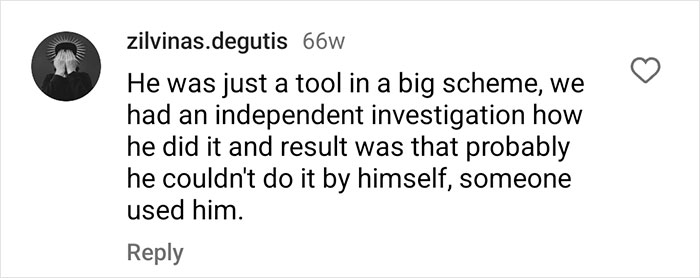You know those emails where someone pretends to be your boss or long-lost relative, asking for a wire transfer or sensitive personal information? You read it and think, who would fall for this?
It turns out, a lot of people do—including those who work at some of the biggest tech companies in the world, and Evaldas Rimašauskas took advantage of this like few scammers ever have.
A couple of years ago, he set up a fake company in Europe and fooled employees at Google and Facebook into believing he was actually their trusted business partner.
In 2017, Evaldas Rimašauskas became infamous in his home country, Lithuania, but he’s still relatively unknown outside of it

Image credits: Google
Evaldas Rimašauskas and other unnamed co-conspirators impersonated a Taiwan-based hardware manufacturer, Quanta Computer — with which both companies were involved — by setting up a company in Latvia with the same name.
Rimašauskas served as the sole member of the board of directors for the fake company and opened, maintained, and controlled various accounts at banks in Latvia and Cyprus in the name of the fake company.
The group created fairly convincing forgery emails using fake email accounts, which looked like they were sent by representatives of the real Quanta in Taiwan.
They sent these emails with fake invoices to employees at Facebook and Google who regularly conducted multimillion-dollar transactions with Quanta, and those employees paid out more than $120 million to the fake company’s bank accounts.
While Frank Abagnale—famously played by Leonardo DiCaprio in Catch Me If You Can—forged checks and posed as a pilot, Rimašauskas took a more modern approach

Image credits: Brett Jordan / Pexels (not the actual photo)
While Rimašauskas was waiting to be extradited from Lithuania to the United States, his wife, Olga, contacted local journalists to plead his case by claiming he was too dumb to pull off such an operation.
Olga, who said she only found out about it after her husband was taken into custody, explained that the couple was “detained by the economic police. I didn’t understand anything because they said, ‘Don’t worry.’ The prosecutor couldn’t speak, but he would get in touch with Evaldas tomorrow and everything would be okay. And that was it.”
According to her, she only realized what was happening when the media started reporting about it.
“I respect my husband. He is a good man. But he simply doesn’t have the brains for something like this. He’s not a hacker. His computer skills are below average. He doesn’t speak English and has never visited the United States.”
Olga further emphasized that her husband’s entire knowledge of the English language could have been boiled down to just four words: “Oupn ze dor, plyz.”
She insisted that Evaldas was tricked into participating in the scheme without understanding it and was made the scapegoat.
The woman said that while Evaldas was working in Moscow, he met some people who later offered him a business opportunity. They suggested he buy a company in Latvia and look for suppliers for representatives of Google and Facebook, with whom, as she understood, he had made connections in Moscow.
She explained that Rimašauskas did not have access to the accounts of the Latvian “Quanta” clone. Although he was listed as the formal owner and director of the company, he supposedly delegated the authority to manage the accounts in Cyprus to someone else. She claimed not to know the identity of the person managing the accounts but referred to him as a “Russian,” the only detail she provided about this individual.
According to her, Rimašauskas expected to earn a commission for his formal role, with promises of a percentage of the contracts he helped facilitate. However, she claimed that he never saw any of those “percentages” or the millions from the major corporations he was supposedly involved with.
Sending out a myriad of fake invoices, contracts, letters, and other “documents,” he successfully bamboozled Google and Facebook into paying him over $120 million

Image credits: Behnam Norouzi / Unsplash (not the actual photo)
But after he was handed over to American authorities, the man pled guilty to wire fraud. He was sentenced to 60 months in prison, and U.S. Attorney Geoffrey S. Berman said: “Evaldas Rimašauskas devised an audacious scheme to fleece U.S. companies out of more than $120 million, and then funneled those funds to bank accounts around the globe. Rimasauskas carried out his high-tech theft from halfway across the globe, but he got sentenced to prison right here in Manhattan federal court.”
In addition to the prison term, the judge ordered Rimašauskas to serve two years of supervised release, to forfeit $49,738,559.41, and to pay restitution equal to $26,479,079.24.
Berman praised the outstanding investigative work of the Federal Bureau of Investigation and thanked the Prosecutor General’s Office of the Republic of Lithuania, the Lithuanian Criminal Police Bureau, the Vilnius District Prosecutor’s Office, and the Economic Crime Investigation Board of Vilnius County Police Headquarters, the Prosecutor General’s Office of the Republic of Latvia, and the International Assistance Group at the Department of Justice, Canada, for their assistance in the investigation, arrests, and extradition, as well the Department of Justice’s Office of International Affairs.
Eventually, Rimašauskas was caught, extradited to the US, and sentenced to 60 months in prison

Image credits: Glenn Carstens-Peters / Unsplash (not the actual photo)
But many are only now finding out about his stunts























The post Lithuanian Man Sends A Fake Invoice And Hopes For The Best, Google And Facebook Pay Him $120M first appeared on Bored Panda.
from Bored Panda https://ift.tt/tTdm6bh
via IFTTT source site : boredpanda